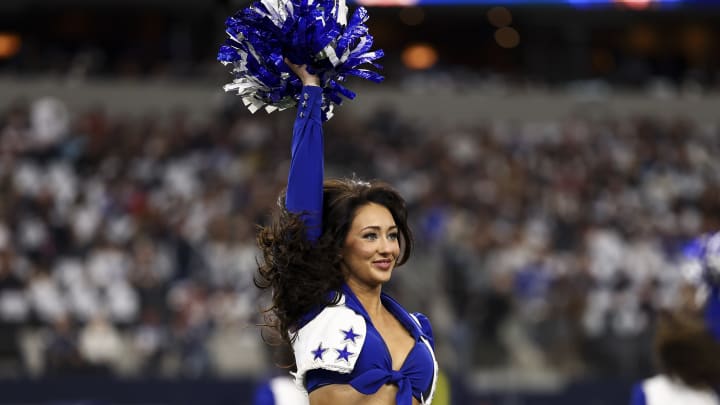A Former Denver Broncos Cheerleader on What You Don’t See in ‘America’s Sweethearts’

Former Denver Broncos cheerleader Berkleigh Wright is more than content with her decision to retire from the team and sport that truly changed her life. Along with her, she’s taking nothing but the fondest memories and a set of life skills including time management, leadership and cooperation. And, upon turning 30 this month, she’s embarking upon a new chapter of life.
Watching the viral new America’s Sweethearts: Dallas Cowboys Cheerleaders documentary on Netflix, of course, resurfaced some emotions for the Kansas native, who spent five seasons dancing with the team.
We caught up with the SI Swimsuit rookie, who traveled to Belize for her feature in this year’s magazine, and got some insight into how accurate the series is, while also getting the tea on what Netflix didn’t show.
“The accuracy is so uncanny, so it made me feel a certain way, for sure. I definitely cried after every episode, because I was so connected to it and felt like I was reliving [that lifestyle]. It was really eye-opening to get a lot of those things out for the public to be aware of. I felt good emotions but also PTSD a bit,” she candidly shares. “[The show] did a great job of depicting everything we go through. As tough as it was to watch it back, I think it’s great for people to have more awareness about the job. Hopefully it spreads respect for the career and the women who do it and [an understanding of] why we do it.”
The seven-episode documentary follows the 2022-23 football and cheer season, from auditions and training camp to making the team and practicing leading up to the playoffs. The series portrays the mental and physical toll it takes to not only make it on the cheer team each year, but also survive through the season.
A mental game
Wright says all cheerleaders are perfectionists, and it has to be that way.
“We are held to an extremely high standard, not only by the coaches, organization and ourselves, but also by fans,” she explains. “We are put on a pedestal, and it’s our job to make sure that that pedestal stays and we continue to earn our spot. It is 100% a mental game every single day—doesn’t matter if you’re a rookie or captain, that mental game never gets easier.”
Similar to most of the women on the show, Wright, who was one of four team captains in her final year with DBC, also works a full-time job. She feels blessed to have a remote position as an account manager at Oracle, but for a lot of teammates, their work is not that flexible. A day in the life for some cheerleaders can look like waking up at 6 a.m. for their corporate job, heading to the stadium for practice until 11 p.m., then going back home. But, it doesn’t even end there.
“You’re constantly trying to think proactively about what you have upcoming. We like to show up professional and prepared,” she shares. “Even though we might not be [physically] on the clock, we’re on the clock 24 hours in our minds. [Having a] full-time job doesn’t make our efforts toward the team any less, it just makes us better at time management.”
A lifelong dream
For many cheerleaders, dancing on a football field is a lifelong dream, and Wright, who began cheerleading at the age of 3, is no exception.
Wright joined the dance team at the University of Kansas, and she’s candid about the fact that she took a year-long mental health break, but has no regrets about it. In fact, the short hiatus “lit a fire” in her and reassured her that dance was something she wanted to pursue post-grad.
After college, she debated between moving to Dallas or Denver to try out for the NFL’s respective cheer squads there. Ultimately, Wright decided on the latter because she really wanted to live in Colorado.
“I did not expect to make it. I walked in not knowing anything. I just thought I was walking into another dance audition, but it was obviously way a bigger deal than I ever expected. I ended up making it [my first year], which was so amazing, and then I uprooted my life and it was one of the best decisions ever,” Wright shares. “The last seven years that I was a part of the organization, but the five that I was on the team, definitely shaped me. It’s taught me so much, brought me experiences that I would never, ever gain otherwise. I think it’s also pushed me to take it to the next level with Sports Illustrated Swimsuit.”
Wright, who retired from cheer this year, says that while she was prepared to work super hard and have her life consumed by cheerleading, there was no way to anticipate just how much of a time and mental commitment cheerleading would be.
What America’s Sweethearts didn’t show
America’s Sweethearts took a critical and candid lens on portraying what it takes to narrow down hundreds of talented dancers who audition to a team of 36. Wright says the approach was important, but there are a lot of positives she experienced over her years with DBC that, of course, are the reason she stayed for so long. Her decision to leave the team wasn’t one spurred by negativity or even exhaustion, but rather by knowing that it was time for her to move on, leaving with nothing but the best memories.
“I think that [director and executive producer Greg Whiteley] really took, for lack of better terms, a more negative approach, which is great for awareness, because we do go through a lot,” she candidly states. “But I think one of the things that really brings us joy and makes us want to come back [each year] is all the positives that they didn’t show.”
Wright explains that while being on the field and dancing alongside your best friends is an electric feeling like no other, some of her favorite parts of the experience were the team bonding and how close-knit the squad became in such a short period of time. What she will miss most about being a cheerleader, however, is as simple as the locker room camaraderie, and she really wishes the show had filmed and included more in that regard.
“Obviously when we’re ready to get to work, we get to work and we’re serious,” she explains. “ ... I mean, when you watch Hard Knocks, you see the guys messing around with each other, goofing off, having fun, and we do so much of that, too. That would have been a really cool side to show of the girls, because we do have fun personalities, we’re goofy and we’re smart. That’s what makes us a family, that’s one of the biggest things I miss from being on the team.”
Leaving everything at the door
All cheerleaders have the mentality of leaving everything at the door, Wright says. When you walk into practice, everything going on externally has to be put aside and your main focus is practice. But, in turn, the sport allows you to leave everything behind for a few hours each night, serving as an “escape” from daily life. If you love the sport, it will love you right back.
“It really is a sisterhood. I had times in my life that I wouldn’t have gotten through without this team and I think that everybody could say that,” she gushes. “I’m extremely grateful because I know not everybody has a support system like that. That being said, I will say, what we do is such an escape.”
Wright references an episode of America’s Sweethearts in which DCC Madeline Salter received a call that her father passed away. Despite hearing the news, she took a few moments to process, then chooses to get back on the field and cheer through the rest of a game. Wright says she understands Salter’s actions because “when we get on that field, that’s where your mind is. You’re so beyond present. A lot of people find a lot of solace in what we do.”
Wright adds that the idea of leaving everything at the door goes both ways. All the criticism or tough moments from one day are never carried outside of practice, let alone to the next day.
“As you can see from the show, we are constantly criticized because we need to put on a professional, clean, amazing product on the field,” she explains. “We are very disciplined, but you have to be able to come back the next day being like, ‘It doesn’t matter what happened yesterday. This is a new practice.’ Our coaches don’t remember if they got mad at us or yelled at us for a certain part ... That’s one of the hardest parts—having to separate ourselves and accept that it’s not personal, it’s part of the job.”
